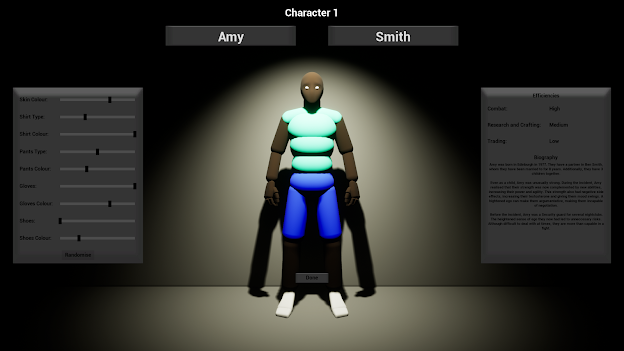Additional Thoughts and Developments
Additional Thoughts and Developments
Over the last week, I have began to think in depth about the core of my research and the gap I want to fill in this Character Development topic I have chosen. My thinking has come into the area of what mechanics are most effective for creating these synergies between players and characters. And what mechanics are maybe obselete when it comes to nourishing a relationship between a player and their character/s.
Before getting into the mechanics I will use, I feel it will be good practise to again outline the intended direction of my title, in order to present a more rounded case for each of these mechanics inclusions. My game will use influences from current popular media, as well as historic cases of soldier and military development. Drawing influences from the Covert CIA experiments (Codenamed MK Ultra) of the 50s and 60s, as well as the hit Netflix series Stranger Things, and film/book series such as Harry Potter and The Lord of the Rings, my title will task the player with developing a small squad of soldiers, enhancing them with abilities and equipment so that they can be used individually in missions such as looting, attacking and monitering enemy bases. The player will be given a squad of 3 characters and will see their story develop, both in line with the players actions and their own dynamic and generated lives. Below, I will look at mechanics which I have thought about in order to develop these characters in line with my plan for the game. From Customisation, Powerful Enhancement opportunities and the development of relationships and character traits.
On this note, I have outlined some mechanics and game features that I feel I am capable of exploring and gaining feedback on, with the plan being to implement them in their core forms, before playtesting and narrowing my focus to those mechanics that have gained the best reaction. Having said this, here are the mechanics I will begin to look at:
Perma-Death: This mechanic has become a staple in games which use multiple characters for the player to influence, such as the XCOM series and more recently, the survival/looting shooter Escape from Tarkov. In XCOM, a playermay develop their squad and use them in tactical turn based combat to complete their objectives, before exfiltrating. However, should one of their characters die, they are intended to be lost for the remainder of the games playtime. Similarly, in Escape from Tarkov, players are given the choice between using their main character, or a randomly generated character whom they can use to fulfil sporadic objectives, such as looting. Should the player die before extracting whilst using their main character, then although they will not lose their character for good, they will lose all of their characters progress and equipment permanently. As Escape from Tarkov is an online experience, this mechanic feeds the games trade market, as other players may loot your body and then use or sell your equipment themselves. In my game, I intend to use this Perma-Death mechanic in order to create a sense of risk v reward for players. Their favourtite character may be their most powerful, yet they may not risk that characters mortality over a simple looting expedition. This will hopefully offer the player a very important dilemma and this additional thought about risk could be key to them becoming attached to their character. On an additional note, I hope to take this mechanic a step further in a direction I have seldom seen before. By offering the player the opportunity to surrender when using a character, they may temporarily lose them, but will save them from death. Once surrendered, they will have the opportunity to rescue the character using another from their team, leading me into my next mechanic.
Relationship Development: In line with feedback I have gathered about how other people have experienced character attachment, I have been thinking about the importance of inter-character relationships and how they influence a viewer/gamers attachment to the character. A characters relationship and behaviour with others allows the opportunity to showcase relatable and desirable personality traits, which flesh out a character and ultimately make them much more attachable. A good example of this from feedback came with the film 1917, in which the person asked said the characters and their experiences together had a major influence on how the person viewed them and made them desire a happy ending for each character individually. Seeing moments of weakness and moments of joy and togetherness made the characters relatable and offered the person viewing them the chance to become attached to these almost touchable characters. To do this in my game, I have thought about implementing a relationship system. Characters with things in common and shared experiences, for example the rescuer/rescuee relationship I spoke about above will lead them to gain bonuses and such from each other. This will give the player an incentive to follow these lines of relationship development and should ulmiately make the characters much more relatable. On top of this, the characters could receive random relationship developments which are out of the players control. This also came from feedback from others, as it was suggested that characters with a reason to keep on surviving gave them a sense of wanting them to succeed. This deeply emotional bond is absolutely essential to making a character relatable and so the implementation of a system that for example, gives a character a family out of the players control will hopefully intensify the thought processes around the characters wellbeing.


Comments
Post a Comment